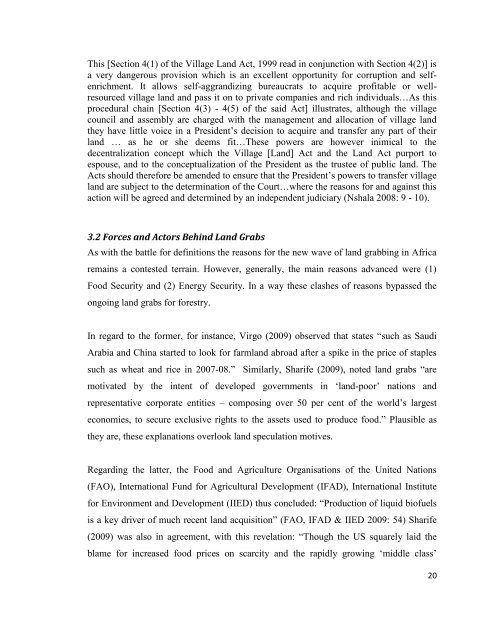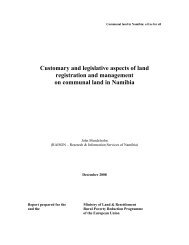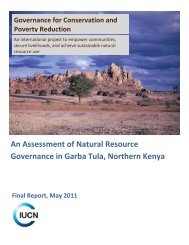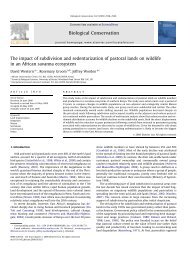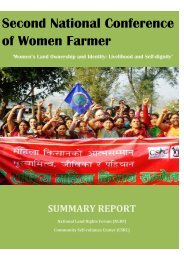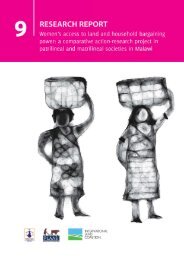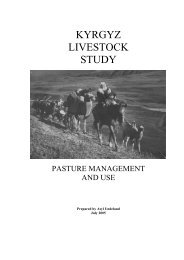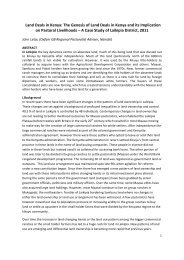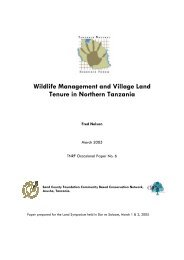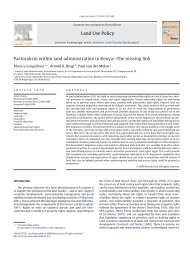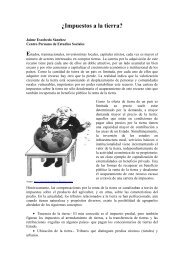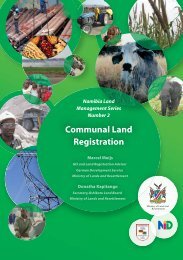accumulation by land dispossession and labor ... - Land Portal
accumulation by land dispossession and labor ... - Land Portal
accumulation by land dispossession and labor ... - Land Portal
Create successful ePaper yourself
Turn your PDF publications into a flip-book with our unique Google optimized e-Paper software.
This [Section 4(1) of the Village L<strong>and</strong> Act, 1999 read in conjunction with Section 4(2)] is<br />
a very dangerous provision which is an excellent opportunity for corruption <strong>and</strong> selfenrichment.<br />
It allows self-aggr<strong>and</strong>izing bureaucrats to acquire profitable or wellresourced<br />
village <strong>l<strong>and</strong></strong> <strong>and</strong> pass it on to private companies <strong>and</strong> rich individuals…As this<br />
procedural chain [Section 4(3) - 4(5) of the said Act] illustrates, although the village<br />
council <strong>and</strong> assembly are charged with the management <strong>and</strong> allocation of village <strong>l<strong>and</strong></strong><br />
they have little voice in a President‘s decision to acquire <strong>and</strong> transfer any part of their<br />
<strong>l<strong>and</strong></strong> … as he or she deems fit…These powers are however inimical to the<br />
decentralization concept which the Village [L<strong>and</strong>] Act <strong>and</strong> the L<strong>and</strong> Act purport to<br />
espouse, <strong>and</strong> to the conceptualization of the President as the trustee of public <strong>l<strong>and</strong></strong>. The<br />
Acts should therefore be amended to ensure that the President‘s powers to transfer village<br />
<strong>l<strong>and</strong></strong> are subject to the determination of the Court…where the reasons for <strong>and</strong> against this<br />
action will be agreed <strong>and</strong> determined <strong>by</strong> an independent judiciary (Nshala 2008: 9 - 10).<br />
3.2 Forces <strong>and</strong> Actors Behind L<strong>and</strong> Grabs<br />
As with the battle for definitions the reasons for the new wave of <strong>l<strong>and</strong></strong> grabbing in Africa<br />
remains a contested terrain. However, generally, the main reasons advanced were (1)<br />
Food Security <strong>and</strong> (2) Energy Security. In a way these clashes of reasons <strong>by</strong>passed the<br />
ongoing <strong>l<strong>and</strong></strong> grabs for forestry.<br />
In regard to the former, for instance, Virgo (2009) observed that states ―such as Saudi<br />
Arabia <strong>and</strong> China started to look for farm<strong>l<strong>and</strong></strong> abroad after a spike in the price of staples<br />
such as wheat <strong>and</strong> rice in 2007-08.‖ Similarly, Sharife (2009), noted <strong>l<strong>and</strong></strong> grabs ―are<br />
motivated <strong>by</strong> the intent of developed governments in ‗<strong>l<strong>and</strong></strong>-poor‘ nations <strong>and</strong><br />
representative corporate entities – composing over 50 per cent of the world‘s largest<br />
economies, to secure exclusive rights to the assets used to produce food.‖ Plausible as<br />
they are, these explanations overlook <strong>l<strong>and</strong></strong> speculation motives.<br />
Regarding the latter, the Food <strong>and</strong> Agriculture Organisations of the United Nations<br />
(FAO), International Fund for Agricultural Development (IFAD), International Institute<br />
for Environment <strong>and</strong> Development (IIED) thus concluded: ―Production of liquid biofuels<br />
is a key driver of much recent <strong>l<strong>and</strong></strong> acquisition‖ (FAO, IFAD & IIED 2009: 54) Sharife<br />
(2009) was also in agreement, with this revelation: ―Though the US squarely laid the<br />
blame for increased food prices on scarcity <strong>and</strong> the rapidly growing ‗middle class‘<br />
20


